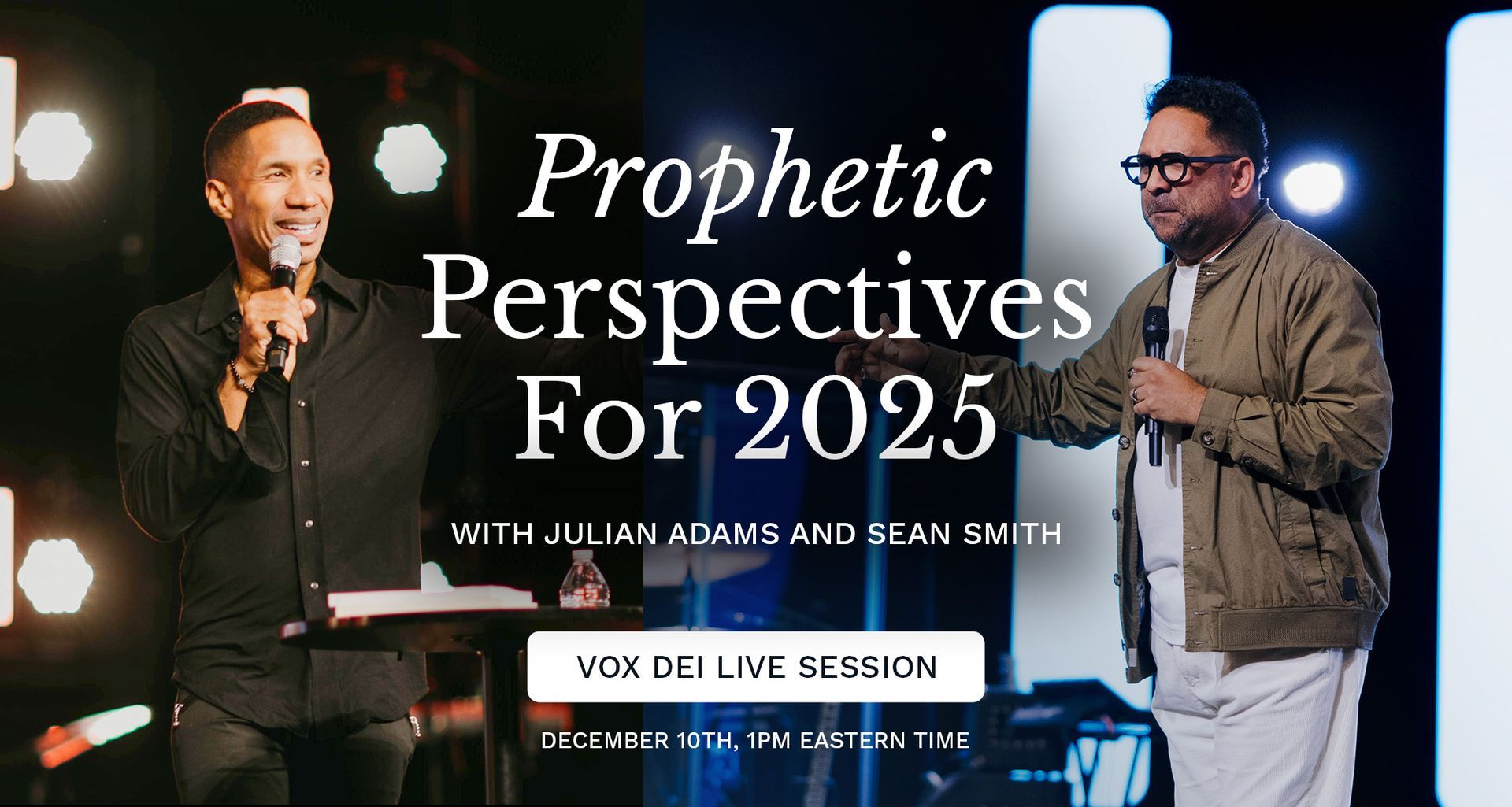Words of knowledge
Julian Adams • October 30, 2017

I often get asked about my process of receiving words of knowledge. Here is the answer to that question in my latest VLOG. I hope this helps you understand the prophetic a little bit more, and gives you the confidence to step out in words of knowledge yourself. Look out for next week’s video!
This post was originally published on JulianAdams.me
– TRANSCRIPT
So the promises that happen in my mind when I’m asking God for words of knowledge is actually, really simple.
LEANING INTO GOD IN
Worship: My posture is one of expectation that God wants to speak to me. Not just for me.
Love: but because He actually loves people. And words of knowledge are a revelation of His heart. A revelation of His love towards people. And so I’m leaning into that love.
Security: I’m leaning into the security that God wants to speak more than I want to hear.
And it’s in that space that God often will drop, normally a word, or slight impression. I don’t know if you’ve ever slept on what’s called a memory foam pillow. When you sleep on a memory foam pillow, it’s like there’s an impression of your head left in the foam even when you lift your head up. And that’s, kind of, what happens to me. It’s like God places an impression on my heart, on my mind, through pictures, through maybe sensation in my body, through a feeling, or through some information that randomly just drops into my mind, into my head. And it’s there. It’s like I can’t get rid of it and those are some key ingredients that help me know that it’s probably God because I’ve got a developed track record now with Him. And so I listen to that and I step out on that.
FRAME IT IN AN EASY WAY
I try to frame it, if someone is not being exposed to words of knowledge, I will frame it in a very easy and accessible way, like, “Hey, do you have a son?”
If they say, “Yes,” and if I’ve got the name I’ll go, “Is his name, Jonathan?” And they’ll go, “How do you know that?” That’s the point that I then go, “Well, God likes to speak to us and He just gave me a word for you.”
If they say, “No,” it means I can walk away without having to defend God, as it were. I just get to reveal God’s heart. Most times they’ll ask why, at which point I can say, “I’m practising hearing God’s voice and I just wanted to share something of God’s heart for you.”
If it’s in church, I think one of the key things for me is framing it in, as an accessible way, and really going after the word of knowledge with clarity, and again, everything has to be bathed and marinated, as it were, in the heart of God.
It needs to flow from love. We don’t just want information for information’s sake. We want information for love’s sake, so it reveals God’s heart.
So the process for me is very simple. I have learned how to recognize the impressions, the thoughts, the pictures, the words, the little thoughts that pop into my head randomly, particularly when I’m talking to someone or praying for someone, I’m leaning into the love of God because he wants to speak very clearly. And I then step out on the basis of that. And the reality, sometimes, we make lots of mistakes, but the more we keep leaning into God’s love, and not our performance, or our need to get more information, but simply that He is love, the more we get to see breakthrough in these areas of words of knowledge.

If you want to grow in the prophetic, it doesn’t begin with what you say. It begins with what you see. The prophetic is rooted in perception. Not just natural insight, but spiritual awareness—what Scripture calls “the eyes of your heart.” Paul prayed that the church in Ephesus would have their hearts enlightened so they could truly see what God was doing. “I pray that the eyes of your heart may be enlightened in order that you may know the hope to which He has called you…” (Ephesians 1:18) God isn’t distant or withholding. But if we’re going to hear Him clearly, we have to see differently. We need Heaven’s perspective. And that means learning to quiet the noise, tune into His voice, and let Him train our inner vision. You don’t need to wait for a dramatic vision or audible voice. Often, God speaks through a nudge. A mental picture. A scripture that lingers. A sense of burden or joy that feels holy. These are the first signs that your spiritual eyesight is awakening. But it takes time. It takes attention. It takes trust. Just like physical muscles grow with use, your spiritual senses grow as you spend time with Him—not just talking, but listening. Not just asking for answers, but asking for His perspective. You were never meant to live according to what the world says is true. You were meant to live by every word that flows from the mouth of God. A Prayer for This Week: “Lord, open the eyes of my heart. Teach me to see what You see—not just in others, but in myself, in my circumstances, in the world around me. Give me clarity and confidence to trust Your perspective more than my own. Amen.” This week, pay attention to what you notice. The way you see is often the way He speaks.

We are living in a world of dramatic change. The relentless pace of development often leaves us breathless and exhausted. The demand for innovative ways of communicating, inventing, and staying ahead of cultural trends can feel daunting and demoralizing. It can push us into a space where we find ourselves trying to copy rather than be authentic, to imitate rather than create. This pressure can lead us to believe that we need to be more creative, and that our individual stories do not matter. But nothing could be further from the truth. Your story, no matter how small, matters and is powerful. One of the remarkable aspects of ancient manuscripts, like the Bible, is that they tell the stories of individuals whose lives may seem small and insignificant. Yet, God chose to make their lives a memorial of what He could do with a life that the world deems insignificant. The incredible power of the gospel is that it changes lives one at a time. God is as interested in the individual story as He is in redeeming the cosmos. The aim of the gospel is not just dealing with personal sin; it is about restoring individuals to a relationship with a kind Father. In his book Mere Christianity, C.S. Lewis beautifully said, "The Son of God became a man to enable men to become sons of God." Justification addresses our standing before God, but our adoption invites us into a relationship with the Father. It allows us to partake of who He is and to live in a place of deep joy from who He is. Romans 3:23 reminds us that "all have sinned and fall short of the glory of God." Many of us forget that the work of salvation has turned this verse around. Through Jesus, we have been restored to the glory of God. One description of the word "glory" refers to the divine quality, the unspoken manifestation of God, and splendor. It is the revelation of God's intrinsic worth and beauty. Do you see that? We have been restored to His divine quality, splendor, and beauty. In a world where it can be easy to feel like just another face in the crowd, remember that your story is significant. Your experiences, your journey, and your voice matter. Embrace the unique narrative God has given you and let it shine. You are not just a spectator; you are a vital participant in God's grand story. Your authenticity, creativity, and individuality are valuable. As you navigate the rapid changes of our world, hold on to the truth that your story has power and purpose. God sees you, knows you, and has a plan for your life that is uniquely yours. Let us celebrate the beauty and significance of each individual story, knowing that together, we contribute to a tapestry of divine splendor and glory.



